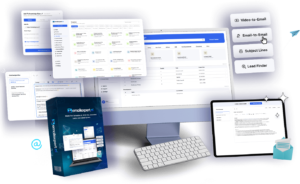Top 10 Ways AI is Changing Everyday Life in 2024
The global AI market is set to hit $1,339 billion by 2030. It will grow by 36.6% each year from 2023 to 2030. AI is changing many areas, like e-commerce, education, and healthcare. It’s making our lives better in many ways.
This article will show you the top 10 ways AI is changing our lives in 2024.

Key Takeaways
- AI market size is expected to reach $1,339 billion by 2030, growing at a rapid pace.
- AI-powered assistants are revolutionizing smart home automation and personal productivity.
- AI is transforming education through adaptive learning platforms and automating administrative tasks.
- Autonomous vehicles and AI-powered navigation systems are enhancing transportation safety and efficiency.
- AI healthcare advancements are improving diagnostics, personalized treatment, and disease prediction.
E-Commerce and Personalized Shopping Experiences
Artificial Intelligence (AI) has changed the e-commerce world. It’s now how customers connect with brands and shop. AI-powered recommendation engines and chatbots are key to this change.
AI-powered Recommendation Engines
AI-powered recommendation engines are changing shopping. They look at what customers like and buy. This way, they suggest products that fit each person’s taste.
Studies show these engines can boost sales by 40%. They make customers feel heard and valued. This leads to stronger loyalty.
AI-driven Chatbots
AI-driven chatbots are also changing customer support. They help with questions and guide shoppers. This makes customers happier and more likely to buy.
Using AI can make customer support 30% better. It cuts down on costs and boosts sales.
AI is making some jobs obsolete, but it’s also creating new ones. It’s important for businesses to keep up with AI. This includes using AI for better shopping experiences and staying competitive.
Education and Adaptive Learning
The education sector is changing fast, thanks to AI. Adaptive learning platforms lead this change. They use AI to tailor educational content for each student’s needs. This means learning experiences are more personal and effective.
A recent Forbes Advisor survey found over 50% of US teachers see AI as a positive force. More than 60% of educators worldwide now use AI in their classrooms. This shows how AI is making learning better.
Adaptive Learning Platforms and Personalized Experiences
AI-powered adaptive learning platforms are changing how we teach. They use smart algorithms to track student progress and adjust learning content. This makes learning more engaging and effective for each student.
AI Automation of Administrative Tasks
AI is also making administrative tasks easier in education. It can grade assignments, track attendance, and manage student records. This frees up teachers to focus on teaching, improving the learning experience.
AI is not just making teaching better; it’s also boosting creativity and critical thinking in students. As AI keeps improving, we’ll see even more exciting changes in education.

Smart Home Automation and Personal Assistants
In recent years, artificial intelligence (AI) has changed how we live, especially at home. AI-powered personal assistants like Siri, Alexa, and Google Assistant make our lives easier. They help us with tasks and improve our experience.
AI is big in smart home automation. It lets us automate tasks, control appliances, and save energy. For example, smart thermostats like Nest learn our preferences. They adjust the temperature to save energy and keep us comfortable.
AI-powered voice-activated assistants change how we talk to our homes. They understand us, respond to commands, and even guess what we need. They can do many things, like set alarms, control devices, play music, and give us updates.
AI is not just for personal assistants and home control. It’s also in lifestyle applications that give us personalized advice and entertainment. As the smart home world grows, we’ll see more AI solutions that change how we live and manage our homes.
| AI-Powered Smart Home Features | Benefits |
|---|---|
| Smart Thermostats | Automatically adjust temperature based on user preferences and weather conditions to optimize energy efficiency. |
| Voice-Activated Assistants | Provide hands-free control of smart home devices, manage schedules, and offer personalized recommendations. |
| Automated Lighting and Shades | Adjust lighting and window shades based on time of day, weather, and user activity to create a comfortable living environment. |
| AI-Powered Home Security | Utilize facial recognition, motion sensors, and video analytics to enhance home security and provide personalized alerts. |
Navigation and Autonomous Vehicles
AI is changing how we travel, making it safer and more efficient. AI algorithms use real-time data to suggest the best routes. This saves time, cuts down on fuel use, and helps the environment.
AI-powered autonomous vehicles are leading the way in transportation. They use sensors and machine learning to drive safely. By 2040, 65% of cars in the U.S. and 80% in Europe will be self-driving.
AI Algorithms for Accurate Route Planning
Navigation systems like Google Maps use AI to find the best routes. They analyze traffic, weather, and travel history. This helps drivers save time and reduce their carbon footprint.
Autonomous Vehicles Powered by AI
The rise of AI-powered self-driving cars is changing the transportation world. These cars have many sensors and use machine learning models to navigate. Studies show a big drop in driver takeover rates, especially in parking.
| Metric | Percentage Reduction in Driver Takeover Rate |
|---|---|
| Highways | 78.8% |
| Intersections | 66.7% |
| Parking | 100% |
The autonomous vehicle market is expected to grow to $115 billion USD by 2029. This will greatly change how we travel in the future.

Robotics and Industrial Automation
The rise of AI-powered robots is changing industrial automation. These smart machines do complex tasks with great precision and speed. They are making manufacturing better and more efficient.
In the car industry, AI robots lead the way. They use advanced vision and learning to assemble parts, paint cars, and check quality. This has made making cars faster and more consistent.
- Cobots (collaborative robots) make automation safer and more flexible. Adding AI to cobots makes them even better.
- Many cobots have AI features. Some can also use outside AI for more power.
- AI helps cobots by combining data from sensors. This leads to smarter decisions and better work.
| AI Application | Benefits |
|---|---|
| Machine Vision | Improves warehouse work by making material handling and logistics better |
| Predictive Maintenance | Saves up to 98% in costs and cuts downtime by 45% by finding problems early |
| Cybersecurity | Finds and stops threats right away, very important in a field hit by 25.7% of cyberattacks |
Adding AI to robots in factories brings many benefits. It boosts productivity, quality, and saves money. As AI robots get smarter, the future of industrial automation looks very promising.
Natural Language Processing and Voice Assistants
Artificial Intelligence (AI) has changed how we use technology. Natural Language Processing (NLP) is key to this change. It lets machines understand and create human language, making things like translation and voice assistants possible. These changes are making our lives better in many ways.
Voice-activated assistants like Alexa and Siri are big examples of NLP in action. They can understand what we say and do things for us. Soon, they might even know how we feel, making our interactions more personal.
NLP is also changing how companies talk to customers. Chatbots can now offer quick, personal help. They help customers and give companies insights into what people want. This helps companies make better products and services.
As AI and NLP get better, we’ll see even more cool things. In the future, chatbots will understand many languages better. Voice assistants will also connect more devices, making our homes and cars smarter.
But we must use NLP wisely. Companies need to make sure these tools are fair and keep our data safe. With NLP, we can make our lives more efficient and fun, shaping our future with technology.
Computer Vision and Image Recognition
Artificial intelligence (AI) has changed how we see and interact with the world. Computer vision is a key part of AI, allowing machines to understand images and videos quickly and accurately. This technology uses advanced algorithms to recognize objects, people, and activities, opening doors in security, healthcare, and self-driving cars.
Enhancing Security and Safety
In security, AI computer vision helps spot and handle threats. It checks surveillance footage in real-time, spotting odd behavior and alerting authorities. AI facial recognition also helps police catch criminals, making public safety better.
Transforming Healthcare
The healthcare world has been changed by AI computer vision. Doctors can now quickly and accurately analyze medical images like X-rays and MRIs. This tech helps in faster diagnoses, monitoring patients, predicting diseases, and finding new drugs.
Empowering Autonomous Vehicles
AI computer vision is also key for self-driving cars. These cars use it to see and react to their surroundings, ensuring they move safely. By using data from sensors and cameras, AI helps self-driving cars make smart choices, making travel safer and more efficient.

As AI keeps getting better, computer vision’s impact will grow. It will change many industries and improve lives worldwide. From making security better and changing healthcare to helping self-driving cars, its uses are amazing.
Face Recognition and Biometric Authentication
Technology keeps getting better, and facial recognition and biometric authentication are now part of our daily lives. Facial recognition technology uses smart AI to identify people by their faces. It’s used in security systems, to control access, and to unlock devices, making it easy and safe to prove who you are.
Apple’s Face ID is a great example of facial recognition in action. It unlocks iPhones and makes payments safe. Thanks to AI and machine learning, these systems can spot people accurately and reliably, better than old passwords.
In hotels, facial recognition is becoming more common. It helps with checking in, recognizing guests, and making their stay better. By using facial recognition and AI security applications, hotels can also improve their identity verification and security. This keeps guests safe and their privacy respected.
As facial recognition and biometric authentication become more popular, we need to think about their ethics and privacy. It’s important to protect people’s data and get their consent. This way, we can trust these identity verification systems and keep them safe.

Healthcare and Personalized Medicine
The use of AI in healthcare is changing the game. It’s making diagnostics better, tailoring treatments, and enhancing patient care. AI can sift through huge amounts of medical data, like scans and patient records, to offer precise and personalized advice.
AI diagnostics are getting really good at reading medical images. They can spot diseases early, even when humans might miss them. AI can also predict how diseases like Alzheimer’s will progress, helping doctors plan better treatments.
Personalized medicine with AI is a game-changer. AI can predict health problems like diabetes or heart disease, allowing for early action. It also helps create treatment plans that fit each patient’s needs, leading to better results.
AI is also helping in drug discovery. It can find new treatments for hard-to-manage diseases faster and cheaper. This AI help is speeding up the creation of new medicines.
The mix of AI and the Internet of Things (IoT) in healthcare is improving patient care. Wearable AI devices can keep track of a patient’s health, sending alerts when something’s off. This helps both patients and doctors stay on top of health issues.
As AI becomes more common in healthcare, it’s key for hospitals to work on making everything work together smoothly. It’s also important to keep healthcare workers up to date on AI. This way, they can use AI to its fullest potential in helping patients.

Cybersecurity and Network Threat Detection
In today’s digital world, artificial intelligence (AI) and machine learning are key to keeping our data safe. AI helps protect our personal info and keeps big companies’ digital systems secure. It’s at the heart of stopping network threats.
AI watches over our networks, spotting threats fast and finding new ones. It uses smart analytics to act quickly and stop attacks before they start. It also checks emails for scams, stopping fake messages and harmful links.
| AI Cybersecurity Solutions | Key Benefits |
|---|---|
| Network Threat Detection | Rapid identification of known and unknown threats, enabling proactive security measures. |
| AI-powered Anti-Phishing and Anti-Spam | Protecting email inboxes by analyzing content, detecting impersonation, and identifying malicious attachments or links. |
| AI in Enterprise Security | Enhancing the security of critical digital infrastructure and sensitive data through advanced analytics and automated response capabilities. |
AI is now a must-have for cybersecurity experts. It helps organizations fight off new threats and keep their digital stuff safe. With AI, we can face the digital world with more confidence and strength.

Conclusion
AI is changing our lives in big ways. It’s making shopping and learning better. It’s also making cars drive themselves and helping with health care.
More than 60% of companies use AI every day. They think it will make their businesses better. This shows AI is making a big difference in our future.
AI is getting better and will change our economy and society fast. It’s making work easier and helping companies use data better. The AI market is growing fast, expected to hit $1.81 trillion by 2030.
But, there are challenges like making people trust AI and getting ready for an AI future. Using AI in a way that’s clear and fair is important. It will help us all use AI’s power better.
The top 10 ways AI is changing our lives in 2024 show its big impact. It’s changing how we live and work, and how humans and AI will work together.
FAQ
What is the expected growth of the global AI market?
The global AI market is set to hit $1,339 billion by 2030. It will grow at 36.6% each year from 2023 to 2030.
How are businesses adopting AI?
72% of businesses are using AI for at least one function.
How is AI transforming the e-commerce industry?
AI is making shopping better for customers and helping businesses run smoother. It uses AI for recommendations and chatbots.
What are the benefits of AI in education?
AI makes learning more personal and helps teachers with tasks. It uses adaptive learning and automates some work.
How is AI integrated into lifestyle applications?
AI helps with daily tasks and entertainment. It manages schedules and home appliances with ease.
What are the AI-powered features in navigation systems?
AI analyzes traffic and weather for the best routes. It also powers self-driving cars for safer travel.
How are AI-powered robots enhancing industrial automation?
AI robots do tasks like assembling and painting. They boost productivity and quality in manufacturing.
What are the applications of Natural Language Processing (NLP)?
NLP lets machines understand and create human language. It’s used for translation, sentiment analysis, and voice assistants.
How does computer vision work?
Computer vision recognizes objects and activities in images and videos. It’s used in security, healthcare, and self-driving cars.
What are the benefits of face recognition technology?
Face recognition technology is fast and secure. It’s used for security, access control, and device authentication.
How is AI transforming healthcare?
AI improves diagnosis and treatment plans. It analyzes images, predicts diseases, and helps find new drugs.
What is the role of AI in cybersecurity?
AI watches network traffic for threats. It protects data and secures digital spaces. It also fights phishing and spam.













